Good Violence, Bad Violence: The Ethics of Competition in Multiplayer Games by C. Thi Nguyen & José P. Zagal
Transforming violence into meaningful struggle in multiplayer games
The study of ethics in single player games has gained attention from the scientific community. A similar level of interest hasn’t reached the multiplayer scene, where the actors are pitted against other human beings with similar or differentiating attitudes towards competition and ethics in general. The paper “Good Violence, Bad Violence: The Ethics of Competition in Multiplayer Games” by C. Thi Nguyen and José P. Zagal proposes an ideal moral competitive game, where the adversarial nature supports the creation of meaningful struggle for all involved.
To create struggle, there must be violence, which the authors separate it into two forms. “Significant violence” attacks basic human resources such as their health. Violence is significant when it goes beyond affecting just the current situation. “Mere violence” is everything not significant and occurs in all competitive games. It consists of adversarial acts to truncate the opponents’ plans. This can mean taking their game resources such as chess pieces or a gold mine in a video game. But beyond the immediate game setting, it does not harm the opponent. You’re even expected to provide such obstacles for your opponent to create a meaningful struggle – an idea which lies in the core of the paper’s proposal.
From the literary selection, Steven Weimer’s 2012 paper “Consent and Right Action in Sport” and Bernard Suits’ 2005 book “The Grasshopper: Games, Life and Utopia” are picked to represent the two key aspects of ethical behaviour. Both must be fulfilled for the authors’ proposal of ideal moral competitive game to take place. Weimer argues that in the core of an ethical game is consent. If both players agree to take part in the game, the follow-up is considered ethical. The authors claim this as incomplete and use Suits’ account to complete the picture. Suits argues that to play a game is to voluntarily take up obstacles for the sake of the experience of overcoming them. The actual in-game goal is a playful one, deeply arbitrary and disconnected. Since the end-goal has little merit, the meaning must come from the struggle towards it.
In a competitive multiplayer game, this struggle is provided by your opposition. Thus, your opponent has the ethical responsibility to provide you with a suitable level of hardship. These two guidelines – consent and the experience of struggling – must be followed for the competition to be ethical. This in turn creates two mechanisms by which games transforms violence: transformation through consent with social contract and aligning mere violent actions for another’s desire to struggle. Seemingly bad violent actions can now be perceived as good.
The latter part of the paper takes value-laden phenomena in competitive games and examines how they relate to ethical play, consent and will to struggle. Ganking – killing a lower player in a manner there’s no question of the winner – is very contextual. Consent might be given, but there is no meaningful struggle. Therefore, authors argue it does not fulfil the requirements of ethical play.
Spawn-camping or the act of taking unfair advantage over respawning or appearing players might involve consent, as the camping player adheres to the rules of the game and the other player has agreed to engage in said game. However, there is no meaningful struggle and the consent is undermined by the camper via unfair and unforeseen advantage.
Trash talk, i.e. verbally insulting others in an online game is the most divisive one. It can be seen as a meta-game, where goading your opponent creates more advantageous climate for you to function. Therefore, the trash talker is only playing to win. It is also highly subjective in its effect. Others are deeply disturbed while some might relish the occasional banter. So to provide a meaningful struggle for certain players, you could be even expected to trash talk back at them.
As a conclusion, the authors argue that without context, an in-game action cannot be viewed as good or bad and game can transform their meaning. Aggressive behaviour is not inherently evil, so finding the right opponents are a key to ethical play. The ideal competitive setting comes from matching players of equal skill-level and ethos together, where “best moves or plays I might take are coincidentally those that result in the best possible degree and type of challenge for my opponent”.
Good Violence, Bad Violence: The Ethics of Competition in Multiplayer Games by C. Thi Nguyen & José P. Zagal
Published: DiGRA/FDG ’16 – Proceedings of the First International Joint Conference of DiGRA and FDG
Dundee, Scotland: Digital Games Research Association and Society for the Advancement of the Science of Digital Games, August, 2016, Number: 1, Volume: 13
Image: In-game screenshot of a fleet of players on EVE Online. Copyright: CCP Games 2017.

